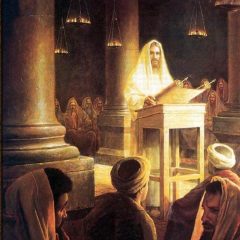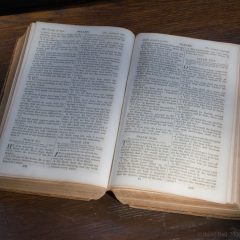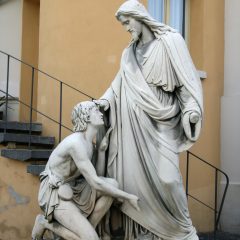Bible
Your Words Are Spirit And Life
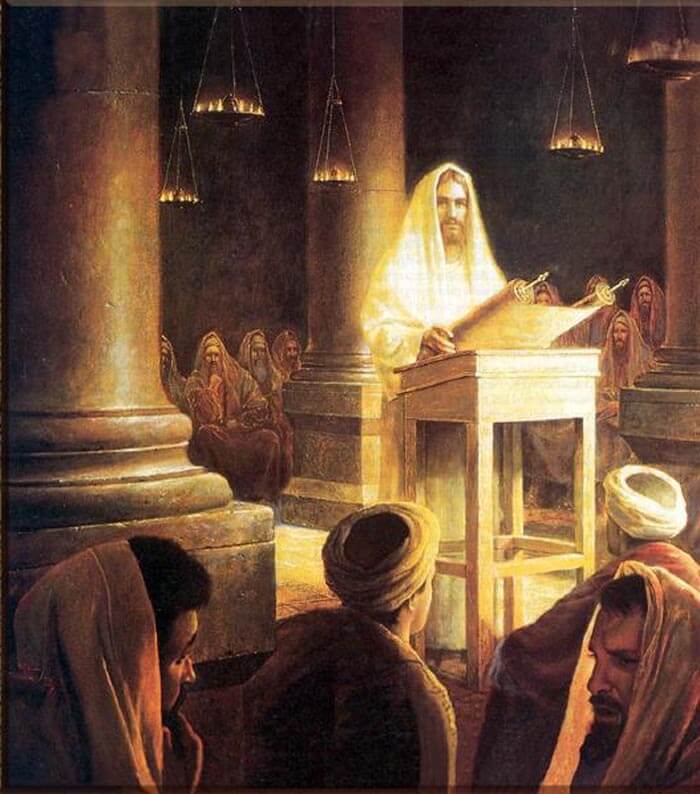
3rd Sunday Ordinary Time
Fr. Mark Gatto
Preached: January 23, 2022
You words are spirit and life. This Third Sunday in Ordinary time is now known within the Catholic Church as Bible Sunday, a day for us to reflect on the gift of the word of God expressed in the Scriptures. The reading of Sacred Scriptures within the community is an ancient tradition within our faith.
Our first reading today tells the story of Ezra having the Law being read before all the people gathered together. This was about 400 years before the coming of Jesus. The Book of the Law they were reading from was probably from the Pentateuch, the first five books of our Bible today. It was connected to Moses. We hear that the Levites read from the Law and then gave interpretation so that the people understood the reading.
Then we see Jesus in the Gospel come into the synagogue in Nazareth, his home town. It says that it was his custom to go to the synagogue on the Sabbath. There he gets up and reads from the scroll of the Prophet Isaiah. The passage he reads to them is interpreted to be connected to his life and mission.
In our two thousand year Catholic tradition, a constant practice when we gather to worship is to have the Sacred Scriptures proclaimed. There are two parts of the Mass, the Liturgy of the Word and the Liturgy of the Eucharist. Word and Sacrament are connected. In fact, the primary place for the reading of the Scriptures is within the church gathered for worship. Like the people gathered around Ezra 2400 years ago, like the people in the synagogue at the time of Jesus, like Christians throughout church history, when we gather as the people of God, we listen to the Scriptures proclaimed in our midst.
As Catholics, the Bible as our Sacred Scriptures is to be the soul of our theology and spirituality. St. Jerome said that the ignorance of the scriptures is ignorance of Christ. We are all called to read, pray with, and study the Scriptures. How can we deepen our knowledge and prayer with the Bible? On the home page of our parish website, there is a link to biblical resources provided from the Diocese of Hamilton to assist us in studying and praying with the Bible. I encourage you to go there to use these resources.
But, throughout our faith tradition, from the time of Ezra in our first reading, to the time of Jesus in the synagogue on the sabbath, and throughout church history, the primary place of reading the Scriptures is to listen to them proclaimed in the gathering of the people of God.
As Catholics, when we gather on Sunday to celebrate the Eucharist we listen to Scripture readings that are provided in a Lectionary. It provides readings for each Sunday over a three year cycle. This year we are in Year C, with a focus on the Gospel of Luke. Wherever you went to Mass this Sunday anywhere in the world, you would have heard these same readings that we just heard.
The priest does not choose readings, but takes the readings provided by the church in the Lectionary. Each Catholic who was at Mass throughout the world this Sunday heard the same readings that we just heard. Including the Pope in Rome or the smallest church in far away countries.
Our practice is to also use a Book of the Gospels. The Gospel reading is found in this Book. It is meant to highlight the central importance of the Gospels in our reading of the Bible.
If you were to ask me how to start praying with the Bible, I would recommend that you begin by using the readings from the Lectionary. Each week before Sunday, pray with the Gospel for that Sunday, and then if possible to the other readings. Take out your Bible and read around those readings if necessary to get a fuller context. If you have read, studied and prayed with the readings before you come to Mass on Sunday, the Liturgy of the Word will become more alive for you.
Your words are spirit and life. We join the ancient tradition of listening to the Sacred Scriptures proclaimed when we are gathered as the people of God. Let this word touch your mind and heart by reading, studying and praying the Bible.
The Catholic Faith Video Series: Your Tough Questions Answered [Video #14]
Question: Are there sections of the Bible which are supposed to be taken literally? If so, what are the names of those sections?
Please watch video below for answer:

If you prefer to read, below is Fr. Paul’s Answer:
First of all – thank you for this excellent question which comes to us from one of our high school students. This answer will be geared towards the high school class which asked this question.
Let’s take a look at 2 important points: Biblical studies, and secondly, the origins of the Bible.
1.0 – Biblical studies
This area of study is immense. It covers topics such as interpreting the Bible, the origins of the various texts and what they meant in the original context and culture they were given in, understanding the ancient languages they were written in, the sociological and theological implications of the texts, the genre and style that different texts were written in and much more.
Obviously we won’t be able to cover much in a short video but hopefully we can clarify a few things about the Bible and get you started down the extremely interesting rabbit hole known as Biblical studies.
2.0 – Where did the Bible come from?
So where exactly did the Bible come from? I think a lot of times we almost assume that the Bible dropped in our laps from the sky – or that the early Jewish prophets walked around with stone tablets writing what they saw or disciples or apostles followed Jesus around with a notebook, writing the Gospels as they went along.
The Bible actually comes to us from human beings who were inspired by God. It is a compilation over thousands of years of how God works and continues to work through the lives of human beings. The first disciples and apostles were eyewitnesses to Jesus- His life inspired them so much they dropped everything they were doing, and formed the Church – a community of like minded people who followed Jesus.
At first, this group known as the Church, or the first Christians, or followers of Christ was very small. They practiced everything that Jesus had taught them – the Mass, the sacraments like Eucharist, Confession, Sacrament of the sick, priesthood, but since it was a small group of friends – there was no need to write it down or codify it. Over time, their good lives influenced other people, who also wanted to become Christians. As such, over the years, the need gradually came to write down the deeds of Jesus and the Church and compile them into a holy book known as the Bible.
Since the Bible came from the Christian community, or the Church, it was interpreted and understood always in the context of their Catholic faith which they practiced daily.
Fast forwards to today. There is an idea that we can separate the Bible from where it came from – the Church – but it is simply not possible. You need one to understand the other – and it makes logical sense, because the Gospels didn’t fall down from the sky – but was a product of God working through the Christian community.
If you want to know what is literal in the Bible and what isn’t – look to what we believe as Catholics. The Bible and the Church can’t literally be at odds with themselves – because the Bible comes to us from the Church – the community of Christians.
It’s a fascinating area, and the deeper you go, the more detailed and cool things you’ll learn about the Bible and about Christianity and why we do what we do. A wonderful area to start is this: Fr. Mike Schmidt and his podcast “The Bible in a Year”. It’s available for free on most podcast apps – highly recommend it.
Thank you for listening in to this Question and Answer series. If you have follow up questions to this answer or have other questions send them in to us.
The Good News
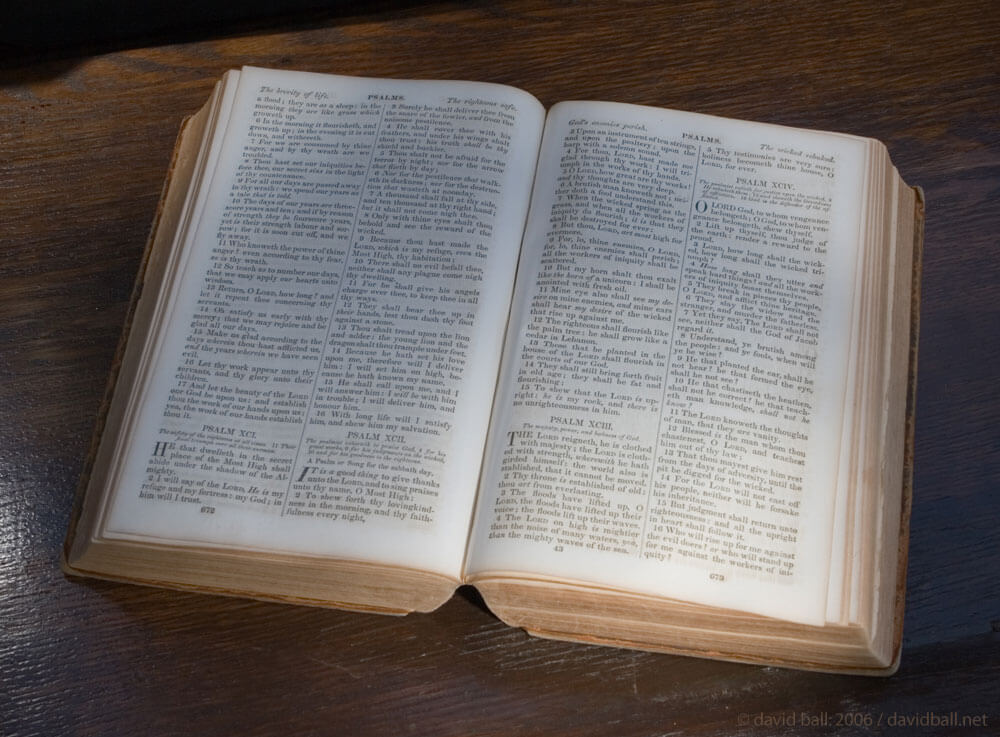
Third Sunday in Ordinary Time – Word of God Sunday
Fr. Paul Patrick, O.M.I.
Posted: January 24, 2020
1.0 Euangelion
“After John had been arrested, Jesus went into Galilee proclaiming the Good News from God. ‘The time has come’ he said ‘and the kingdom of God is close at hand. Repent, and believe the Good News.” (Mark 1:14-15)
In our reading for this Sunday from the Gospel according to St. Mark, the author uses an interesting term multiple times: Good News. What does this term mean and why is it used?
A few weeks ago we celebrated Christmas and most likely either heard or read the well known proclamation from the angels to the shepherds regarding the birth of Christ. “And the angel said to them, Fear not: for, behold, I bring you good tidings of great joy, which shall be to all people.” (Luke 2:10) In the original Greek text, the word used in both the Gospel according to Mark and the Christmas story from Luke is the same Greek word euangelion.
The word Gospel comes from the early Anglo Saxon words good spiel or literally good news or glad tidings which in turn is the Anglicized translation of the Greek euangelion. This word originally meant ‘the reward given to the one who brought good news’ as in a messenger in ancient times who brought good news to people who were waiting to hear the news of some major event in their country, such as a battle. Therein is contained a sense of joy, of relief, of happiness, to hear the wonderful news – the euangelion that the battle was over and peace would return. This phrase was later adopted by Greek speaking Christians to describe the greatest news they had ever and would ever receive, the good news that Jesus loved them and came to change their lives forever.
2.0 – Why Good Tidings of Great Joy?
Oftentimes as Christians we use ‘religious words’ which have to a certain extent lost the original weight of their meaning in the context of the 21st century. I believe that the words Gospel and Good News or Glad Tidings could sometimes fall into that category. It is important to reflect from time to time on their original meaning because it sheds a different light on the Gospels and allows me to read and meditate on the Gospel with perhaps a different perspective and viewpoint than before. The Gospels are a joyfull story of salvation which is a testament of God’s enduring love to His people.
During the course of my studies I had the privilege to study with a brilliant Scripture professor who told our class repeatedly: “The only way to truly understand the Gospels is with joy in your heart”.
3.0 – Word of God Sunday
On September 30 2019 Pope Francis declared the Third Sunday of Ordinary Time “Word of God Sunday” In a document entitled “Aperuit illis” – “He opened their minds” – the Pope highlighted the importance the Word of God should have in the life of every modern Christian.
One of the ways God reveals Himself to us – or in other words – one of the many ways we can learn more about God and His plan for my life is by reading and meditating on God’s word.
Something you might want to consider during the lockdown is to read a little scripture every day. It can be as simple as praying a short prayer to the Holy Spirit for enlightenment and then reading the Gospel for the day and reflecting how the Lord is speaking to you through the Gospel reading.
If you find it hard to get started, there is a very good program running at the moment on both Apple and Google podcasts entitled Bible in a Year by Fr. Mike Schmitz. It is presented in an approachable and easy to understand format. It is also a wonderful way to introduce a little daily Scripture into your life in a guided format which removes the mystery and anxiety which might prevent you from reading God’s Word on your own.
Have a wonderful Sunday and let us allow God to continue to speak to us through His Word 😊
Lenten Reflection Series
Wednesday March 25, 7pm. at Corpus Christi Site:
“Catholics and the Bible”. A Liturgy of the Word with talk on how Catholics understand the Bible. This evening we will be hosting two volumes of the St. John’s Bible, a great opportunity to examine this beautiful work of art. See below for more information about the St. John’s Bible.
Wednesday April 1, 7pm. at Our Lady of Lourdes Site:
“Becoming the Body of Christ” A Scriptural Rosary with a talk on the meaning of the Eucharist.
The Saint John’s Bible is a hand-written and hand-illuminated Bible encompassing seven volumes: Pentateuch, Historical Books, Wisdom Books, Psalms, Prophets, Gospels and Acts, and Letters and Revelation. St. John’s Abbey and University commissioned British calligrapher Donald Jackson to oversee the creation of The Saint John’s Bible, the first of its scale commissioned by a religious order in 500 years. The Diocese of Hamilton is home to a Heritage Edition of The Saint John’s Bible. It is a fine art reproduction of The Saint John’s Bible. The Heritage Edition reproduces all of the illuminations and text of the original, highlighted using real gold.
Is The Bible Good News Or Bad News? – Fr. Mark

3rd Sunday In Ordinary Time – Year C
Fr. Mark Gatto
Preached: January 27, 2019
The Bible can be used for good and for bad. Certainly, in history when used by people in the wrong way, it has been destructive. It has been used to justify the burning of heretics, the Crusades, slavery, apartheid, homophobia, oppression of native peoples and so on. All justified by the selective use of Scripture quotes.
The problem is not with the Bible, but with those of us who read the Bible and use it in the wrong way. That is why it is not enough just to have a Bible or to memorize passages in the Bible. We need to learn to read the Bible in a way that is thoughtful, intelligent, prayerful. We need to read the Bible so that it changes us and not us changing the Bible.
So, how did Jesus read the Scriptures? Jesus would have read what we refer to as the Old Testament, the Hebrew Scriptures. He would have been immersed in the Scriptures and known them well.
In the Gospel of Luke that we just heard, we see Jesus come into the synagogue and he gets up to read the Scriptures and he is given the scroll from the Prophet Isaiah. He selects a passage to read. “The Spirit of the Lord is upon me, because he has anointed me to bring good news to the poor. He has sent me to proclaim release to the captives and recovery of sight to the blind, to let the oppressed go free, to proclaim the year of the Lord’s favour.”
Jesus selects a passage that speaks of good news, for the poor, the captives, the blind, the oppressed. For Jesus, the Scriptures were primarily a source of Good News, calling him to bring healing, mercy, freedom to all in need.
Then after reading the passage from Isaiah, Jesus says, “This passage is fulfilled in your hearing today.” For Jesus, the Bible was not just about what God had done in the past. The Scriptures are meant to change us, to inspire me to live in a new way today.
So, how do we use the Scriptures? We need to read the Bible in such a way that it changes me and how I live. When we use the Bible, do we use it to bring life or to condemn, to bring mercy or to judge? Do we use it for people or against people? In our reading and use of the Bible, is it Good News or does it become Bad News?
When our reading of the Bible leads us to hate, to prejudice, to condemn, or to reject science, when our reading of the Bible seems to be Bad News rather than Good News, then we need to examine our reading of the Bible.
It is not the Bible that is the problem, but we who read and misuse it. Always be wary when politicians use the Bible, for often we see them using the Bible for their own purposes, often in a way that is Bad News for certain people.
Fundamentalism is a danger with the Bible because it wants black and white, simple certainty, and so fails to see the complexity and need to use our intelligence. We need to read the Bible as a spiritual writing that requires reflection and study.
Our response we sung today said, “Your words, Lord, are spirit and life.” Enter into the Scriptures, read the Bible as a spiritual work that is to bring spirit and life. Whenever you hear the Bible being used in a way that seems to be Bad News, be very careful about how it is being used.
The Bible can be used for good or for bad. We need to follow the path of Jesus who read the Scriptures in a way that was Good News. Read and pray with the Bible in such a way that we are open to the Spirit changing us through these words.
How Are You Blind? – Fr. Mark
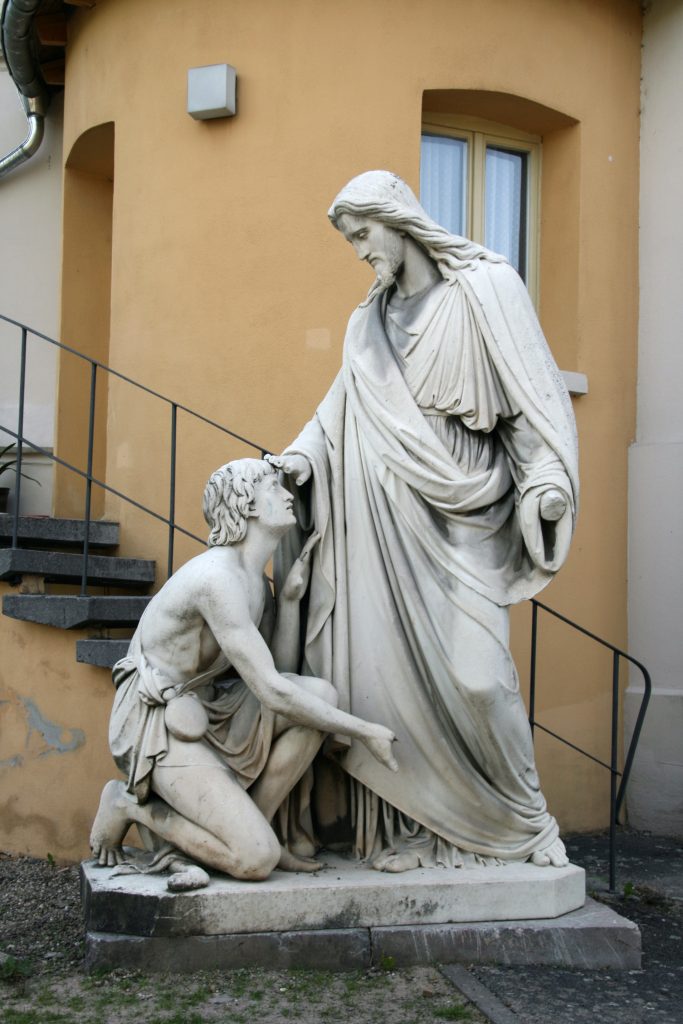
30th Sunday In Ordinary Time – Year B
Fr. Mark Gatto
Preached: Oct. 28, 2018
The Bible is a foundation of our Catholic Faith. It should be central in the spirituality of each one of us. There are many ways to read the Bible. We can study it in order to understand it more fully. But, most importantly we are to pray with and meditate on the Bible. For it is the Word of God that leads us into a closer relationship with the Living God. It is not a book of science nor a book of history, but it is a book to lead us into relationship with God. When we reflect on the Gospels we are able to know Jesus more deeply.
One way of praying with the Gospels is to use our imagination. St. Ignatius encourages us to enter into the Gospel passage with our imagination. In the passage we just heard of the healing of the Blind Man, if we only see a nice miracle that happened 2000 years ago, it will not change us at all. But, if we see ourselves as that Blind Man and imagine that encounter with Jesus, then it can challenge me today.
It might lead us to ask, How am I blind?
How do I need healing so that I see again or in a new way?
- Those who are married might ask, “am I blind to the needs of my spouse?”
- Parents might ask, “am I blind to the needs of my children?”
- A friend might ask, “am I blind to the needs of a friend?”
- Many of us might ask, “am I blind to the beauty in creation?”
- Others might ask, “am I blind to the reasons I have to be grateful?”
- In what way am I blind in my life and need the healing that Jesus can bring to me?
Jesus calls the Blind Man, he was not rich, he was not famous, he was just a beggar who had nothing to give in return. Yet when he is called by Jesus it says that he “sprang up and came to Jesus.” Do we go to Jesus with such enthusiasm? Do we really want to have our blindness healed? Do we really want to see in a new way?
There is a story of an old Rabbi had become blind and could neither read nor look at the faces of those who came to him. A faith healer said to him, “Entrust yourself to my care and I will heal your blindness.” The Rabbi replied, “There will be no need for that, I can see everything that I need to.”
We can also see in the worse moments, the hardest moments of life. Even these difficult moments can be redeemed. The spiritual life has no dead ends.
Everything can be used for transformation. When we look at the Cross, we see that God took the worst thing, “the killing of God”, and made it into the best thing, redemption of the world. We need to see in a new way. Suffering is not God’s will, but suffering is one thing that is able to bring down our ego, our arrogance, our pride. Suffering can heal the blindness that prevents us from seeing the needs of others.
We need to be like the Blind Man, springing up to go to Jesus, by meditating on the Gospels.
Enter into the Gospels with our imagination to encounter Jesus. Then, like the Blind Man, we may be healed of any blindness in our lives. Even might be able to see underneath the suffering and hurts of life.
There is a new movie out called A Beautiful Boy about a father trying to save his son from his struggle with drug addiction. I have not seen it yet, but I did read a review and saw this quote, “Underneath the scars and flaws, underneath the mistakes we make and the falls we take, a tiny glow of our God given beauty lingers.”
We all need to go to Jesus like the Blind Man, to heal any blindness that we have to needs of others, any blindness to the beauty and goodness in our life. We need Jesus to heal that blindness that prevents us from seeing that beauty lingering within others and within ourselves.
The Word Of God – Fr. Mark

Fourth Sunday In Ordinary Time – Year B
Fr. Mark Gatto
Preached: Jan 28, 2018
Jesus entered the synagogue and taught. They were astounded at his teaching. What would it have been like to be there in that synagogue as Jesus was teaching. To see him, to hear him. How he sounded, what he taught. That would be special to actually be in that place where Jesus is present teaching. Sometimes we think about how special it must have been for those people alive at that time to be there.
But every time we as Catholics come to celebrate the Eucharist, Jesus is present Sacramentally. In the Assembly gathered, all of you who are the body of Christ. In the priest, who is the sacramental presence of Jesus presiding. In the bread and wine that becomes the real presence of Jesus for us. And in the Word of God proclaimed in this Mass, Jesus is present to us, speaking to us. Today we are able to see and hear Jesus if we pay attention.
This Sunday our Diocese of Hamilton is having its First Annual Bible Sunday. Bishop Crosby has asked us all to reflect on the Scriptures and to encourage us to pray daily with the Bible. There is a bookmark to pick up and bring home to place in your Bible. It gives a little prayer to use before and after reading the Bible and a simple method for praying with Scripture.
Each time we listen to the Word of God at Mass, each time we read the bible at home, we are to listen as though Jesus is there teaching as he was in that synagogue in today’s Gospel. In our Psalm today we sang, “O that today you would listen to the voice of the Lord.”
A priest told me a story of a young woman who was in the RCIA preparing to become Catholic. She was so excited about what she was coming to learn about Jesus. She turned to the priest and asked him, what do you still want to learn about Jesus? He responded: “I would like to learn what was in the heart of Jesus.”
Each time we come to church and listen to the Word of God proclaimed, each time we sit down quietly and read the Gospels at home, we should listen like we are there in a room where Jesus is teaching. Spend time listening to Jesus, come to know him more deeply. St. Jerome once said that ignorance of the Scriptures is ignorance of Christ. ec
This week I visited one of our shut ins who is 93 years old. She is no longer able to get to Mass. At a point she showed me a booklet she receives that has the daily Scripture readings for Mass. She told me that she is so happy to start receiving this because it really has helped her grow in her faith. I hope I am still growing in my faith when I am 93 years old!
Yes, it would have been special to be in that synagogue as Jesus came in to teach. But, we can be in the presence of Jesus teaching, each time we come to Mass and listen attentively to the Word of God proclaimed. We can be in the presence of Jesus teaching, each time we sit quietly reading the Scriptures with our hearts open listening to the voice of the Lord.
